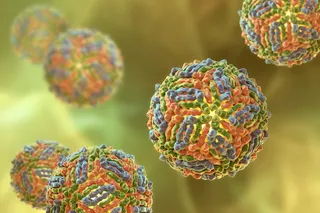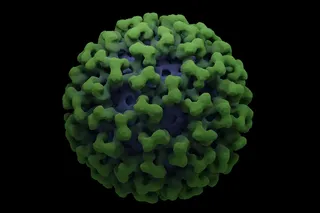What animal kills more humans than any other? The answer is not rhinos, or tigers, or even sharks. The answer is the tiny mosquito, vector for the Plasmodium parasite that causes malaria.
Each year more than 600,000 people die from the mosquito-borne illness, despite interventions, including the use of insecticide sprays, vaccines, and insecticide-treated bed nets, that have reduced deaths from malaria by 50 percent in the last decade.
Unfortunately, mosquitos are developing resistance to insecticides, and drug-resistant parasites are emerging, threatening to reverse this recent progress.
Now, however, a team of researchers at University of California, San Diego, University of São Paulo, Johns Hopkins University, and University of California, Berkeley, have discovered a potential new tool in the fight against malaria. The results were described in a paper published last month in the journal Nature.
Altering the Mosquito’s Genome
By changing a single amino acid in the mosquito’s genome, researchers created a mosquito that did not transmit the parasite.
“It seems remarkable that that particular variant has such a huge effect,” says Ethan Bier, geneticist at UCSD and lead author of the study. “To be honest, I still can’t believe this.”
A gene known as FREP1 is necessary for mosquitoes to function. It also plays an important role in the passage of the parasite from the mosquito’s gut to its salivary glands, where it can be transmitted to humans, explains Scott Lindner, co-director of the Center for Malaria Research at Penn State University, who was not a part of this study, but who has done work on the transmission stages of Plasmodium parasites between mosquitoes and mammals.
Blocking the Parasite
Previous trait-mapping research had suggested that a naturally occurring variant of FREP1 could help reduce transmission of malarial parasites by the mosquito, but without interfering with the insect’s fitness.
The current study showed that this is indeed the case. The study compared two strains of mosquitoes that differed only in that single amino acid in the FREP1 gene. This change not only blocked the main parasite, Plasmodium falciparum, but it also blocked infection by a distantly related form of malarial parasites.
“That suggests that it's a very broad range of protection that you get with this this change, and that it's general to different mosquitoes as well,” says Bier.
Protection From Malaria with CRISPR Technology
Using CRISPR technology, Bier and his team inserted this variant into another species of mosquitoes, creating a strain that is highly resistant to transmitting the parasite and spreading malaria.
To spread this variant through a larger population of mosquitoes, the team built a variation on a gene drive, called an allelic drive, which changes only the one allele and, if desired, can be eliminated from the population.
“The genetic cassette that brings about that effect is placed in the genome in such a way that it causes a fitness cost on the cassette, then the cassette will disappear,” Bier says.
“Depending on how many mosquitoes you introduce at the beginning, you can get 85 percent to 90 percent of the insects with the variant that doesn’t spread the parasite,” explains Bier. “Or you could get 100 percent. In that case, when the gene cassette that you use to make that change is gone, you’ll have an entire population of mosquitoes that carry the naturally occurring variant.”
The result would be protection from malaria, with little risk of introducing other genetic changes to the population of mosquitoes.
“If we can change the mosquitoes so that they are more resistant to becoming infected with plasmodium,” says Lindner, “that's going to reduce the number of infected mosquitoes in a community, so that fewer people get infected.”
Read More: This Medication Could Make Human Blood Deadly to Mosquitos, Combatting Malaria
Resistant Mosquitoes in the Wild
Getting a population of resistant mosquitoes into the wild where they are needed takes more than genetic wizardry. It also takes organization, co-operation, and diplomacy.
And that’s the job of Ana Kormos, director of the University of California Malaria Initiative (UCMI). The UCMI takes a relationship-based approach to eradicating malaria using genetic technologies.
This approach involves direct partnerships with local governments and local populations.
“In concert with many partners, we’re working hard to advance to a field trial [of Bier’s research], and we’re hopeful for progress soon,” says Kormos. “Our goal is to save lives, and this gets us one step closer.”
Article Sources
Our writers at Discovermagazine.com use peer-reviewed studies and high-quality sources for our articles, and our editors review for scientific accuracy and editorial standards. Review the sources used below for this article:















